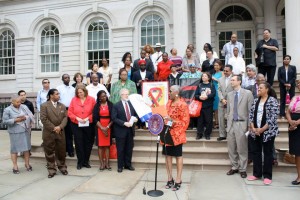Putting the Spotlight on Hepatitis C in the African American Community
 Photo courtesy of NBLCAOn July 25, 2013, it was my pleasure to join with leaders from the National Black Leadership Commission on AIDS (NBLCAExit Disclaimer), Inc, the Coalition for Positive Health Empowerment (COPEExit Disclaimer), and the Harm Reduction CoalitionExit Disclaimer, in New York City to mark the first annual national observance of African American Hepatitis C Action Day. The commemoration was designed to heighten public awareness about the serious impact of the hepatitis C epidemic on communities of African descent.
Photo courtesy of NBLCAOn July 25, 2013, it was my pleasure to join with leaders from the National Black Leadership Commission on AIDS (NBLCAExit Disclaimer), Inc, the Coalition for Positive Health Empowerment (COPEExit Disclaimer), and the Harm Reduction CoalitionExit Disclaimer, in New York City to mark the first annual national observance of African American Hepatitis C Action Day. The commemoration was designed to heighten public awareness about the serious impact of the hepatitis C epidemic on communities of African descent.
Hepatitis C Disparities Among African Americans
As I’ve discussed in an earlier post, troubling hepatitis C disparities persist in the African American community:
- African Americans are twice as likely to have ever been infected with the hepatitis C virus when compared with the general U.S. population.
- While African Americans represent only 12 percent of the U.S. population, they make up roughly 22 percent of the estimated 3.2 million persons with chronic HCV infection.
- Moreover, chronic liver disease, often hepatitis C-related, is a leading cause of death among African Americans ages 45-64.
Action Day Activities
To raise greater awareness of this significant health disparity and promote education, testing, and treatment in local communities, the organizers of African American Hepatitis C Action Day conducted a variety of activities including:
- An event on the steps of City Hall in New York City which included reading of a proclamation by New York City Mayor Michael Bloomberg. In addition, a number of other political leaders from across New York also signaled their support with proclamations or letters of support, including New York Governor Andrew Cuomo and the New York City Council’s Speaker, Christine Quinn.
- Free hepatitis C testing offered in numerous communities around the state of New York including Albany, Buffalo, New York City (including East and Central Harlem, Brooklyn and the Bronx), and Rochester.
- A webinar on African Americans and Hepatitis C on which I served as a panelist along with Marlene Taylor, PA-C, of the Montefiore Medical CenterExit Disclaimer, and Malinda Ellwood, JD, of the Harvard Law School’s Center for Health Law and Policy InnovationExit Disclaimer. The 90-minute webinar put the spotlight on information about the impact of hepatitis C among African Americans and strategies to address the hepatitis C epidemic in the African American community. Panelists addressed issues in hepatitis C care and treatment for African Americans as well as the role of the Affordable Care Act in addressing prevention, treatment, and access to care for people living with viral hepatitis C. You can listen to the webinar and view the slides hereExit Disclaimer.
“Getting tested and getting treated is making a commitment to your family, friends, other loved ones, and our entire community that hepatitis C will not destroy us,” observed one of the day’s organizers, Ms. C. Virginia Fields, President of NBLCA. “We have too much to live for and too much work to do.”
Spotlight on Addressing Hepatitis C in New York
According to NBLCA, nearly 200,000 New York State residents are thought to be chronically infected with HCV, 60 percent of them in New York City alone. Informed by the statistics and CDC’s 2012 recommendation of hepatitis C testing for all “baby boomers”, earlier this summer New York became the first state in the nation to pass a law that would require hospitals and general practice doctors to offer a one-time HCV test to baby boomers.